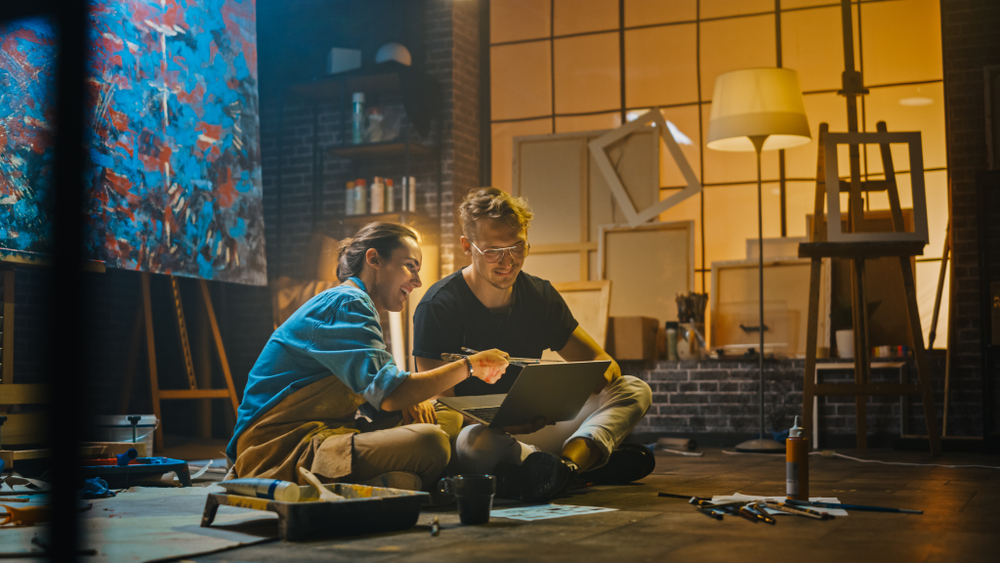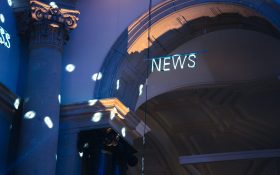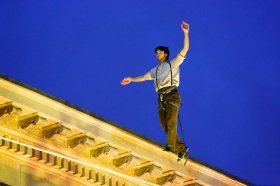Hindsight is a wonderful thing. Looking back, we can see the pitfalls that await us with perfect clarity. We can also see the moments where we went wrong, the mistakes that helped shape us, the dead ends that nonetheless played a key role in helping us develop a particular aesthetic or our own personal management style.
Arts graduates today are most likely entering the sector with a greater awareness of some of the challenges they’ll face in the arts industry than those of us who embarked on arts careers in previous decades. It never hurts to be prepared.
ArtsHub’s editorial team asked a range of artists and arts workers across the country: what do you wish you’d known about working in the arts sector when you were starting out in your career? What advice would you offer your younger self about working in this unique but challenging sector?
Here are their replies.
Anna Spargo-Ryan, Author. Books include The Paper House, The Gulf and A Kind of Magic (forthcoming).
‘I wish I’d known that being an author is as much a vocation as it is a calling. I had, like so many of us, wanted to be a writer since I was little, but actually arriving at “having a book published” took hard work, patience and persistence – not whimsy. Unless you’re a very famous author, the industry treats you as a person with a job, too; “author” is one part of a complex book-making machine, and I no longer consider it to be any more important than being a great editor, designer, marketer or bookseller.
‘I don’t mean this to sound self-deprecating. The reason I wish I had known this beforehand is so I could more readily embrace my part in this process, as a person whose job it is to write words, to do the work, to enjoy the relationships with the people who make it possible, then write the words again. It is a great privilege to be an author, but it is not wish fulfilment. It is a dream come true, but it is also my job, and thinking of it in that way helps me to keep working hard.’
Felicity Bott, Artistic Director, Great Southern Dance and Independent Artist, Dance Will Save the World
‘Ok, so, in your professional life you are being resourceful, creative, producerly, responsive, responsible, participatory, a “leader”, a colleague, and so on and so on and so on. But please, please make sure that amongst being all these you are also being… mush.
‘Better yet, existentially, make like a liquid regularly: Literally become a puddle by lying, relaxed and fluid, on floors. Well do I know that this is the extent you will need to go to, to step away from your own “surge capacity”.
‘Actually! Go next level and become a gas: make time to float away from expectations and demands of your own self and of/from others.
‘Should you choose to accept this challenge in the years to come, you will preserve your sanity, your physical wellbeing, your relationship with yourself and the quality of your connections with others – at home and out in the world. And the quality of your art.
‘Hold close others in your life who support you to be the mush/puddle/gas you must necessarily become from time to time. Also, make very sure you take your loosey-goosey puddle-self on walks in nature.
‘Basically, learn better how to self-regulate and co-regulate.
‘All this will become even more vital when you become a parent and artist.
‘This is how you can sustain yourself over time to do/share/create/produce/participate in the things/art/lives you deeply value and love.’
Jeff Khan, Artistic Director and CEO, Performance Space
‘I would have created more space to look after myself, and probably put more effort into figuring out what that means. In our resource-starved sector it sometimes feels like there’s an expectation to work infinite unpaid hours and that no matter how much work you put in, there is always more to do. Also, our identities are often very much intertwined with our work, so figuring out more about who you are outside of that, beyond the parameters of your job, might help set up more sustainable support systems in life and avoid the kind of burnout that’s rife among artists and arts workers.’
Joanne Kee, Executive Producer, Riverside’s National Theatre of Parramatta
‘There are so many things I wish I had known, but maybe not knowing beforehand how crazy some of the things I have done are, would have meant that I wouldn’t have done what I did and achieved what I have. So I say be bold, go for it, believe in yourself and if you are not sure about how to do something just ask. I have found an incredible network of generosity and inspiration throughout my career. And maybe, most importantly, be committed to hard work and long hours – a career in the arts is not just a job, it’s an all-consuming vocation and despite the hard times we’ve had recently and are still going through, it is a joy and honour to have creativity at the core of my work.’
Louise Bezzina, Artistic Director, Brisbane Festival
‘Having a successful and meaningful career in the arts is a lifelong dedication, it is all consuming. The role artists or anyone dedicating a career to the arts is embarking on, is a vocation that assists in shaping and guiding a more tolerant and understanding sense of humanity. It is essential work and will be increasingly more crucial as we navigate the complexities of daily life.
‘The last 20 years of my professional life in the arts has been one of discovery, one that has pushed me to my limits. I feel enormously privileged to be in the position I am in, and this opportunity is one that manifested from hard work, dedication, and a commitment to lifelong learning.
‘My advice is to jump headfirst into it. Take all the opportunities that come your way, seize them with compassion and care and be part of the next generation that guides transformation.’
Read: Learning from our art mistakes
Martin Shaw, Literary Agent (Australian but based in Germany)
‘First and foremost, a little bit of forewarning how hard it is to sell a book could have been very useful!
‘But it would have been a shame to have been potentially scared off – as all the failures (authors are not the only ones to have to cope with rejections, remember!) have been a wonderful learning curve for me. Because in my previous job as a bookstore book buyer, I gained a great deal of experience and a reasonable skill in picking the things that were going to, or did indeed, sell… but it’s all a very different perspective when the object is simply a stack of A4 pages or a PDF file that could potentially be THE NEXT BIG THING.
‘And so many factors come into play – it might be utterly up your strasse, but is there a publisher in the land whose taste will similarly align?
‘But the beauty of the book trade is that it’s no science – it relies so much on your gut, your sheer enthusiasm for a project, publishers’ certain degree of trust in your instincts – and an indomitable belief that something should see the light of day. Thus, you do need to have a thick skin – but the rest is a blast: there’s nothing quite as satisfying as being a handmaiden for people with such astonishing writerly chops!’
Nicole Reilly, Artistic Director of Zen Zo Physical Theatre and inaugural recipient of Brisbane Powerhouse’s Wandima Fellowship
‘I listen to my ancestors, my Old People. They show me the correct path.
‘I was so hesitant when I started, thinking I needed qualifications, or that first big show credit to my name, before I could tell stories I thought needed telling. I was so fearful of failing, but that’s really what making art is all about. We either run out of time or money, and that’s the art we share with audiences. We always wish we had more. Time. Money.
‘At Zen Zen Zo we train in methodologies that enable us to embrace the off-balance, to enter challenges, with grace. It took a while, but I really think I’ve sunk it into my body now. I do fail, I fail all the time, but I just get better at failing. So start making things, tell your stories. You’ll find what you need along the way. The right people, the right venue, the right audience. And don’t underestimate how much of an impact having mentors will have on your career.
‘I owe a lot to those I’ve apprenticed with, that have pushed or pulled me up a few steps (or lots of steps). Dr Lynne Bradley, my Zen Zen Zo family, my QUT supervisors Dr Sandra Gattenhof and Dr Leah King-Smith… all my creative friends that let me bounce ideas off them, that have cool practices that inspire me. Do your research, find that person you admire, and then take them out to coffee. See if they’re a match, see if they’ll let you ask dumb questions.
‘We’re always emerging in some area of our practice. I’m happily established as a producer, director, teaching-artist, but in telling my stories, in telling First Nations stories that matter, my Old People keep me humble. I get tripped up if I’m going too fast, if I’m not listening. I might always be emerging at this rate. It’s very humbling at 32 to be remembering my language, to be reclaiming cultural practices that have had to stay hidden for so long.’
Dr Paola Balla, Wemba-Wemba and Gunditjmara artist, curator, writer and academic
‘90% of what you are about to do has nothing to do with art. Get an accountant that specialises in working with artists. Get your head around PAYG! Be proactive and protective about who you share ideas with. If you are a female-identifying Aboriginal artist (especially if you have kids) be bold! Fight for your place because you will have to. National Galleries are violent. Institutions are violent. Stay strong and unafraid of them. They need us – we don’t need them.
‘I would also tell my younger self to not pluck our eyebrows, and well, that’s about it, because every decision, every mistake, every trauma and every challenge has fortified me to become the artist I am.’
Penny Griggs, CEO, Adelaide Central School of Art
‘You’ll never, ever get everything done. There is always more that could have been done and that’s ok!’
Tracy Routledge, Publicist
‘I wish I had studied psychology and juggling and fully understood that being a publicist is a profession based on the triage of every email, text and message – the constant assigning of priority order to tasks based on which is most likely to achieve success for my clients on a deadline. I thought it was a profession where developing strong relationships with journalists would be both critical and time-consuming, but now it is managing the personalities and expectations of the people involved in the projects I publicise that takes the most amount of time.
‘Dealing with journalists takes far less, and is mainly done by email, unlike the individually addressed faxes, repeat land-line phone-calls and face-to-face meetings that were the tools of the trade when I started out. Now it’s quick, transactional and on to the next interview – I have never even spoken to many of my best media contacts.
‘Being a publicist is a job like no other. To your clients you are part friend, part psychologist and 100% professional. Even when they are calling at 4am and all weekend… That’s the bit I really wish I had understood, the expectation that you are on-call 24/7. Perhaps I should have worked in triage – at a hospital.’





